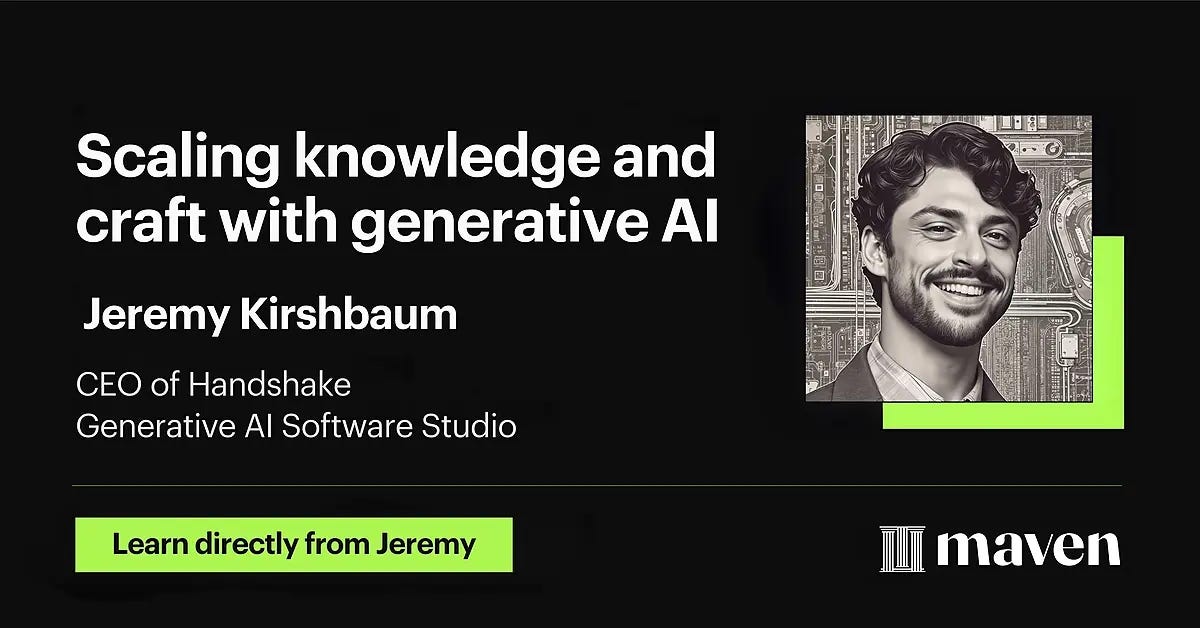Scaling Up Without Scaling Down
The Truth About Quality in AI Implementation
People think that using generative AI content means sacrificing quality. There's a persistent myth in generative AI implementation that goes something like this: "I get the appeal of AI, but our reputation is built on quality. We're not willing to compromise that for volume." I hear this especially often from organizations proud of their high-touch, personalized approach to knowledge work. And I get it. For organizations that have built their reputation on deep human expertise, the prospect of automating their craft can feel like betraying the very values that set them apart. Particularly for groups where insights and ideas are what they offer, 100% quality is non-negotiable.
The truth is that this perceived tension between scale and quality is a misconception that leaves us ill prepared for both present opportunities and future capabilities of generative AI. The real story is far more interesting and nuanced. The opportunity for professional services groups to expand their offerings with generative software is huge. If considering the human market, there are few ways to scale up and expand beyond hiring more exceptionally talented people and experts. Finding this kind of talent is hard, and even once you’ve hired them, it takes a long time to apprentice them into the particular culture and ethos of your organization.
On the other side of the scale, not only is generative AI becoming increasingly dexterous in sophisticated knowledge work, it also provides additional dimensions of interactivity and personalization. Take, for instance, Sisu, a conversation guidance system we developed, which generates multiple-choice assessments that adapt to each user's unique interpersonal challenges. Or WhatIfPedia, which extends traditional expert-driven scenario planning into an interactive world-building experience (This system is in private alpha, so DM us if you want the password). In these use cases, generative AI enhances expert consulting into a dynamic, responsive system, one that adapts to each user's specific context while maintaining the high standards of insight fidelity.
People don’t realize that with today’s models, it is already possible to create ideas and insights at an elite level. But doing so requires a lot more than just copy-pasting content into a chatbot. Building these systems is complex, and the complexity rises exponentially as you push for higher quality standards. At this point, most people have tried putting some of their content into a chatbot or RAG tool. The results are impressive in some ways — in minutes you can get something that’s 70% as good as you’d need it to be, maybe even 90%. But when ideas are your offering — whether that is strategic planning, organizational transformation, or geopolitical analysis, that last 10% really matters. It’s the difference between someone’s amateur Twitter thread and ideas that business will pay hundreds of thousands of dollars to access.
There are both objective and subjective hurdles to overcome when pursuing quality output. On the technical side, production systems involve intricate architectures managing multiple databases, sophisticated routing decisions, and careful context window management. Each component needs to be tested separately and work flawlessly, and then you must face the multi-headed hydra of making them all work together.
There is also the more subjective element which your developers cannot help you with, but on which you can start long before writing any code. At the heart of any knowledge-intensive field lies a sophisticated understanding of what constitutes quality – an understanding that often exists more as professional intuition than documented criteria. The challenge is that your domain experts need to transform their implicit knowledge of excellence into explicit, definable characteristics. Every nuanced judgment, every quality benchmark, every subtle distinction that your experts make must be codified into actionable criteria that can be translated into a systematic framework.
This process of articulation shows that your organization's understanding of excellence isn't a barrier to AI adoption – it's your compass for navigating it. The organizations that will thrive won't be those with the most sophisticated technical implementations, but those who've translated their expertise into clear, actionable frameworks. Begin with the quality standards that already set you apart.
Want to hear more? Join our Lightning Lesson
Building on these insights about quality preservation, we're hosting a free Lightning Lesson on Design Principles for Generative Knowledge Systems. Our session focuses specifically on translating professional intuition into frameworks that scale. You'll learn concrete strategies for documenting and structuring your organization's knowledge in ways that make it accessible for AI augmentation, without sacrificing the sophisticated understanding that sets you apart.



